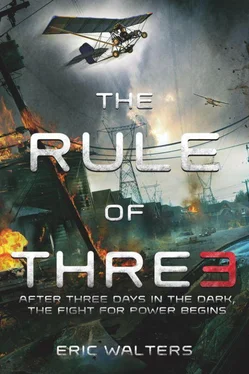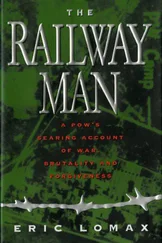The guy laughed. It seemed a nervous laugh. “So what are you doing, threatening to pull a gun on us?”
“If necessary.”
There was a matter-of-fact tone to Herb’s response that made him sound scary. His voice was so calm and cool that I almost felt the chill.
“You shouldn’t fool around with a gun; somebody could get hurt,” the man said.
“Back off, friend, or somebody will get hurt.” Herb pointed a finger directly at the big man who had been doing most of the talking.
The man laughed again. This time it was definitely nervous.
“You can’t go around threatening people,” the man said.
“You can’t go around threatening to steal a car,” Herb replied. “Have any of you ever tried this kind of stunt before?”
“Of course not!” a third man protested, and the others mumbled in agreement.
“Then don’t let a few hours of inconvenience without electricity make you do something you’d never do, something you’re going to regret as soon as things start working again.”
Right before my eyes the men’s stances wilted, their expressions softened.
“It’s just that we’re worried,” one of them said.
“It’s only reasonable to be worried,” Herb said.
“We didn’t mean any harm,” a man who hadn’t spoken before explained.
“We’re just trying to get home to our families,” another added.
“I understand, but there’s no point losing our heads, is there?”
The big man looked down at the ground. They’d gone from acting like a mob to looking like a bunch of embarrassed little boys.
“Don’t worry,” Herb said. “This is just going to turn out to be nothing. An hour or so and it’ll be sorted out.”
“You think so?”
“We’ve all lived through power failures and computer glitches before. No big deal, right?” Herb asked.
Again, general agreement.
“You could wait,” Herb said, “but why don’t you lock up your cars here and start walking? The sooner you get moving, the sooner you’ll be home to make sure your families are fine.”
They started muttering among themselves and moving away. I didn’t care where they were going; I was just glad they were leaving.
“And good luck!” Herb called out. “I’m sure everything will be all right.”
They turned, waved, and kept going. I let out a big sigh of relief.
“I didn’t like that,” I said.
“People can act pretty strange when things don’t go normally. Let’s finish loading up,” Herb said.
Quickly we filled the car with the last of the chlorine and climbed in. Before I turned the key I had another small panic attack. What if it didn’t start? But it turned over on the first try, and the engine roared. All around people turned to look.
“Put it in gear and let’s get out of here,” Herb said.
I didn’t need to be told twice. I backed out and then headed for the street.
“What made you change your mind about it being over soon?” I asked.
“I didn’t. I was just trying to calm the situation. Of course the weapon helped.”
“I can’t believe you’re carrying a gun.”
“We live in dangerous times. A lot of embassy staff had to have one.”
“Even paper pushers?”
“You bet. In some countries embassy staff members are the prime targets for kidnappings and terrorist attacks. Just read the newspaper.”
“But you’re retired.”
“I guess I just got used to having it. I’m legally registered to carry a sidearm.”
I supposed he had no reason to lie to me about this—although I’d mention it to my mother.
“I’m just glad they didn’t challenge my bluff about the gun,” he said. “There was more danger that I’d shoot my foot off than hit one of them.”
“You have a gun but don’t know how to use it?”
“I had some training, but it was a long time ago.”
“You seemed pretty confident,” I said.
“I’m a pretty good actor. That’s a lot of what diplomacy is about.”
If he didn’t know anything about guns, then he was a good actor back there in the parking lot. Or maybe he was acting right now.
“Do you think they were really going to try to steal my car?”
“Don’t be so surprised. Situational ethics can take root in a very short time.”
He could see from my expression that I had no idea what he was talking about.
“It’s simple. The way people act, what they believe is wrong or unethical, changes because of the situation. None of those men woke up today thinking they’d try to steal a beat-up old car from a kid and an old man. Things change, especially when a mob mentality sets in,” Herb said.
“Six of them hardly makes a mob.”
“It’s not the numbers but the attitude. The situation set the stage for their action, provided the fuel, but the big guy was going to be the one to ignite them. Always take on the big dog when you’re attacked by a pack.”
“They were people, not a pack of dogs.”
He smiled. “Of course, but I’ve learned the two have some things in common.”
“Was that part of your embassy work?” I asked. “Taking on the big dogs?”
“Part of life.”
His cryptic responses were driving me a little crazy. “So all embassy staff have to be trained to carry weapons?”
“You’re no stranger to firearms either. Your mother is a police officer, and don’t you have long guns in your house?”
“We have a couple of rifles.” We had three, actually, and a shotgun, secured with the ammunition in a lockbox. The first thing my mother did when she got home every night was to lock away her service revolver in that box. Then I realized he’d avoided answering my question by asking me one. “So some of the places you worked and lived were pretty dangerous.”
“Danger is a relative thing.”
“But compared to here?”
“Almost every place in the world is more dangerous than here. Living in this incredibly wealthy country dulls people to the realities of other places.”
“And those other places?”
“I’ve been stationed in countries where there was virtually no infrastructure or rules. No effective police, spotty communications, virtually no transportation, no running water, no electricity.” He laughed. “Sort of like it is right here, right now .”
“But this is different—it’s only temporary.”
“It’s only temporary after it’s been fixed.”
“But it will be fixed,” I said.
He didn’t answer.
“Right?”
“Of course it will. It’s all a matter of time. Are you still wondering about the chlorine?”
Again, he was changing the subject, but I did want to know about it.
“Do you know about the rule of three?” he asked.
I shook my head.
“It’s an expression that has to do with emergency survival situations. You can go without air for three minutes, without water for three days, and without food for three weeks,” he explained. “Beyond that, you’re dead. In controlled doses, chlorine, the stuff that you put in your pool to kill bacteria and algae and keep the water clear, can make contaminated water fit for drinking.”
That made sense.
“With the power going out, the entire system for maintaining fresh drinking water is gone. Not only can’t they sanitize the water, but they can’t deliver it. That all relies on pumps.”
“But why would you need this much of the stuff?” I asked—and then I realized why. “You think this is going to last a long time, don’t you?”
“I don’t know that,” he said. “I just know that it’s better to have something and not need it than to need it and not have it.”
“But this much?”
Читать дальше












